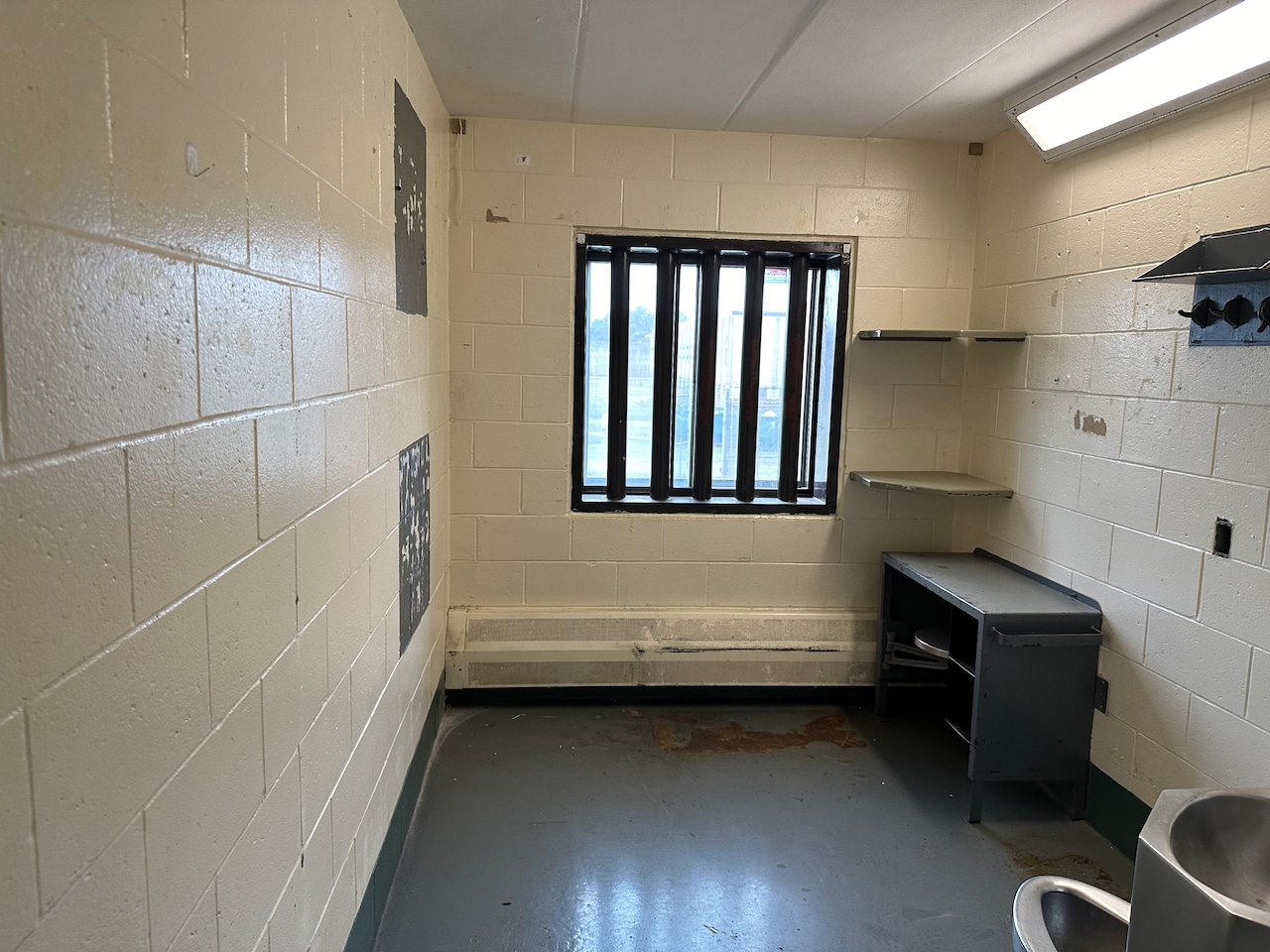It’s peak strawberry season in Massachusetts. But after mid-July, you won’t be able to find any fresh, locally-grown ones in the Bay State.
Unless you’re buying berries that were vertically farmed.
“Not just Massachusetts-specific, but in this part of the country, no matter how much money you pay, you just don’t have access to fresh [picked] produce — [except] maybe, for a month or two, during the summertime,” Hiroki Koga, co-founder and CEO of Oishii, the world’s largest vertical strawberry farm company with grow facilities in New Jersey.
Vertical farming is doing the impossible by filling tables with fresh fruits and vegetables that were grown mere miles away from consumers in places like Massachusetts, even when they’re out of season, Koga said in an interview after his presentation titled “The Future of Agriculture” at the ClimaTech 2024 conference in Boston last week.
As the climate changes and the population grows, Koga and others say that in the future vertical farming will likely become an agricultural mainstay of produce production.
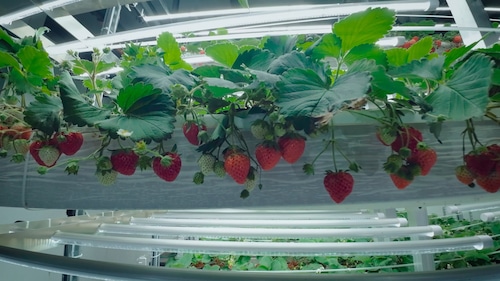
Strawberries growing at Oishii, the world’s largest vertical strawberry farm company with facilities in New Jersey. (Photo courtesy Oishii)Oishii
The process is a high-tech twist on a practice dating back to the Babylonian Hanging Gardens 2,500 years ago. In an ultra-controlled indoor ecological environment, plant containers are stacked atop each other in columns reaching toward the ceiling. Fruits and vegetables cascade over each other as they ripen.
The orientation conserves space and allows for high crop production levels — up to 10 to 20 times more per acre than those planted the standard way in soil, according to James Altland, a research horticulturalist with Application Technology Research Unit in Ohio.
The plants are grown hydroponically, meaning plants sit in a nutrient-rich solution instead of soil. Heat, light humidity, water and even carbon dioxide levels are kept in balance for each plant species’ needs.
Though vertical farming is not yet tracked by the USDA, the agency is funding research into it, according to its 2018 report on vertical farming. As of last year, shipping containers were being converted into indoor landscapes by research plant pathologists in South Carolina for further studies.
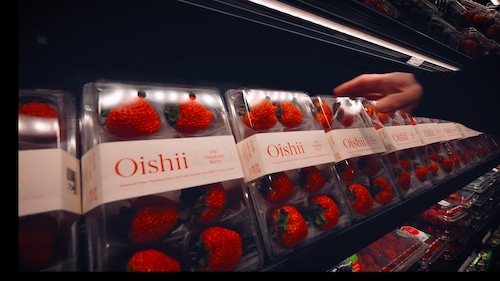
Packages of Oishii strawberries at a Whole Foods Market. Photo by OishiiOishii
“Although vertical farming’s high costs can often be discouraging, shipping containers and abandoned warehouses are readily available and relatively inexpensive,” Vegetable Research Laboratory pathologist Kai-Shu Ling told the USDA in 2023.
“Converting them into vertical farming environments not only breathes life back into discarded infrastructure but also puts fresh produce in parking lots and urban centers,” Ling said.
Warehouses are the new growing fields
Oishii strawberries were introduced to the greater Boston area last fall and are now available in Worcester and Hadley. They were likely grown in an abandoned warehouse.
“Our most recent facility used to be a huge plastic factory, our prior farm used to be a beer factory,” Koga said. “We typically look for a facility that’s within a few hours’ drive from any major city, so [our produce] can reach as many neighboring cities as possible.”
“We can build [vertical farms] anywhere … as long as there’s energy and just a little bit of water,” he added.
The plants come from two types of Japanese strawberry seeds called the Koyo and the Omakase, which are foreign to American agriculture.
Koga explained the berries’ flavor profile is uniquely delectable because Japanese produce has been “bred” for flavor over the years. U.S. produce, he said, was bred to have harder skin and contain less juice to prevent bruising because it is generally grown hundreds or thousands of miles from where it is sold to consumers.
Vertical farming has green benefits, Koga said. His company recycles and purifies water used and part of the process is to collect water from the atmosphere and condensation from plant leaves. Oishii farms use energy from solar panels, there are no pesticides used and the packaging is all recyclable.
Boston start-up company offers counter-top farming
Oishii isn’t quite yet ready to start franchising its technology, Koga said as it looks to expand across the East Coast and into growing other produce, such as melons and tomatoes.
But there’s a Boston-based start-up company looking to expand vertical farming in Massachusetts with its technology.
“The people who will figure out how to get people on Mars? They’re going to need to eat food, and they should be using our technology,” Connor Harbison, the CEO and founder of Atlas Urban Farms, a vertical farm tech company, said during a recent phone interview.
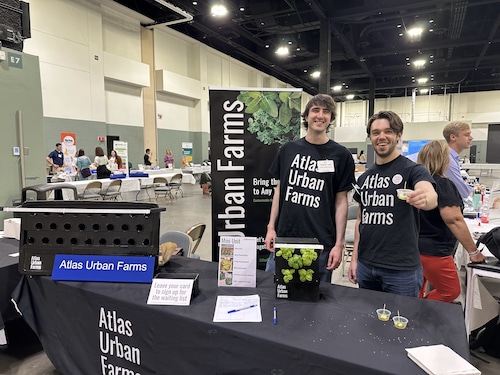
Vaughan Logan (left) and Connor Harbison (right) of Atlas Urban Farms. (Photo courtesy Atlas Urban Farms)Atlas Urban Farms
Atlas Urban Farms uses a new-age process in several ways, including in the form of a petite, $250 black box device called the “Mini.” It’s climate-controlled, hydroponic and can cultivate produce sitting on countertops in commercial and home kitchens.
The company is focused on growing herbs — specifically, basil — but Harbison listed other small fruit and vegetable crops such as peppers, tomatoes, strawberries and cucumbers as a possibility for its device.
“They’re boxes that connect to the internet and with a couple taps of your phone, you tell them what kind of food you want to grow and how to do it, and it will do the rest,” Harbison said. It’s designed for harvesting on a weekly or bi-weekly basis, and customers “don’t have to be a botanist or a farmer” to use the Mini.
The company was formed in 2021 to support vertical farming in restaurants and other large-scale commercial establishments. It was named “Startup of the Year” in the Mass Technology Leadership Council’s Tech Top 50 list in February, which recognizes companies, leaders and technologies that “have made a significant impact” in the state’s tech industry over the last year.
“We are in the process of building larger [devices] that will scale up to entire walls — think entire buildings,” Harbison said.
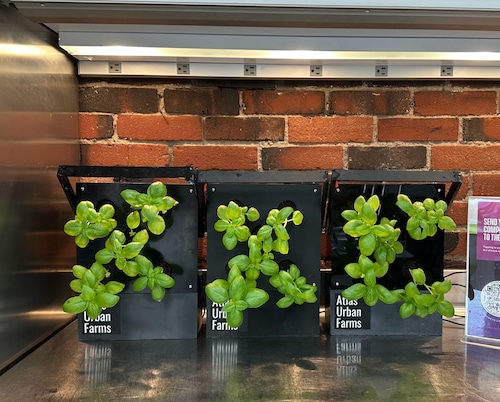
Basil plants growing Atlas Urban Farms’s Mini. (Photo Courtesy of Atlas Urban Farms)Atlas Urban Farms
While looking to further its growth in the commercial space, Harbison said the company already had a mix of “around 200 individuals and organizations” that are Mini customers.
But vertical farming is still largely considered uncharted territory by the Massachusetts Department of Agricultural Resources, as it continually surveys the state’s 7,000-plus farms.
Spokesperson Phu Mai said the state is “aware that vertical farming is becoming a popular method of agriculture in states where farmland is limited,” but has “limited data” on the practice in the commonwealth.
The high cost of vertical farming is shown in the price point of the product. One 4.2-ounce, 20-count package of Oishii mini strawberries costs $9.99, for example — about double the cost of a 16 oz count of “generic” strawberries.
“Our long-term vision is to meet or exceed conventional store prices, and we are currently perfecting several ‘everyday’ berries that we can offer at a lower price point through new innovations,” Koga said.
But he also cited an uncertain future for conventional farming.
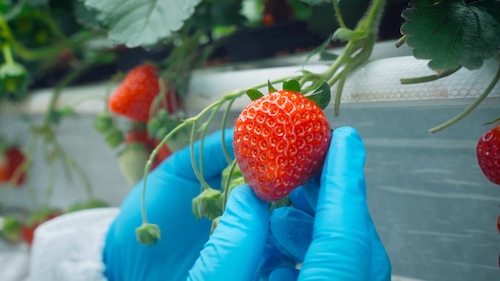
An Oishii strawberry at a facility. Photo by OishiiOishii
“The most important thing that we all need to acknowledge is that conventional farming probably cannot continue doing what it’s doing,” Koga said.
“We don’t have enough land, we don’t have enough of any of these natural resources. It’s a matter of time before the cost of conventional farming is going to skyrocket,” he said, adding consumer prices would also rise exponentially as a result.
That’s the moment when the cost of vertical farming “is going to become cheaper” and therefore more accessible, Koga said.
“What’s going ultimately to happen, is we will have a fresh and more affordable product, compared to conventional farming,” he said. He views the concept as the key to continue growing produce in a local environment as the climate and population change.
And Bay Staters are the perfect candidates to test it all out first, Harbison said.
“Massachusetts is a great place to be building these types of companies for a couple reasons. The ability to have fresh food all year round in a place like Boston is much more salient than in a place like California,” he said.
“But I think the other side of the equation is our talent. I really do think Boston is the leader in [physical] technologies here in the U.S. … real science fiction, we’re building it here today,” he said.






